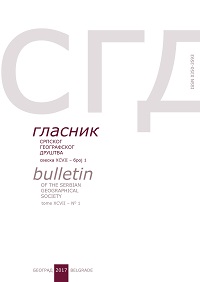Sustainable Planning and Tourism Development Policy Exemplified by Medieval Fortresses Along the River Danube
Sustainable Planning and Tourism Development Policy Exemplified by Medieval Fortresses Along the River Danube
Author(s): Marija Belij, Jelena Belij, Srđan Belij, Marina IlincicSubject(s): Architecture, Geography, Regional studies, 19th Century, Tourism
Published by: Српско географско друштво
Keywords: the Danube; a medieval fortress; tourism; geotourism; sustainable development;
Summary/Abstract: The coastal area of the Danube had the greatest strategic importance in the preservation of the waterway, which was the most important road in this part of Europe until the late 19th century. On the banks of the Danube were located the cradle of many civilizations that were built by European values and identities created by different people. As a natural border Danube has played a significant role in military strategy in the struggle for supremacy and domination of European territories, which are the most significant and most monumental fortress in Serbia, built right on the banks of the Danube. Cultural Route „Fortresses on the Danube“, which floats our sector of the Danube, displays our most important monuments of military architecture in this part of Serbia, the preserved remains of seven fortresses: Bač, Petrovaradin, Belgrade, Smederevo, Ram, Golubačka and Fetislam. Mentioned fortress are an important resource for sustainable tourism development and an important part of the cultural corridor not only in Serbia, but also South-Eastern Europe, which value is recognized by UNESCO. A special segment of the tourism industry in the development of the Danube region represents the development of geotourism as tourism specific niche markets Danube fortresses, and other objects of natural and cultural heritage of the Danube basin is recognized as an interesting tourist destinations and sites worth visiting and retention during a cruise on the Danube. Protection of cultural heritage as a unique and irreplaceable wealth, is very important for the Republic of Serbia and the Danube Region. The development of „cultural routes“ and other forms of cluster connectivity properties of cultural heritage will help better interpretation of heritage and the creation of cooperative networks that will provide obtaining the status of an important heritage resource in the development of cultural tourism and to be involved in politics purposeful tourism planning. Moreover, investments in the restoration of the Danube fortress create the conditions for a greater volume of tourist traffic and a significant share of foreign tourists from cruise ships in their unique offer.
Journal: Гласник Српског географског друштва
- Issue Year: 94/2014
- Issue No: 3
- Page Range: 69-82
- Page Count: 14
- Language: English

